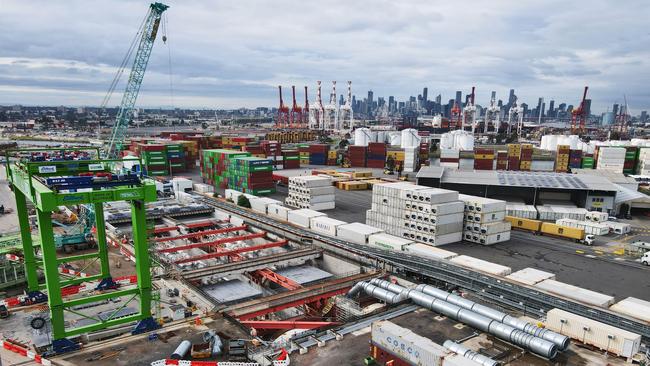
Labor plans to abolish the Australian Building and Construction Commission, a body strongly disliked by the trade union movement. Labor is, in effect, on a promise to get rid of it as part of its partnership and funding arrangement with the unions. It is what the Construction, Forestry, Maritime, Mining and Energy Union – or at least the construction division – expects and, at this stage, Labor plans to deliver its part of the deal if it wins government. But before discussing whether abolishing the ABCC would be good policy – it would not – it’s worth briefly discussing the history and the roles it plays.
The ABCC has been around in a number of guises for some time. It was first established in 2005 by the Howard Coalition government, only to be gutted by Labor in 2012 and renamed the Fair Work Building and Construction Commission. The ABCC was reborn in 2016 with slightly modified, but strong, powers compared with the original body. One point made by the trade unions, which strenuously object to the ABCC, is that it is inappropriate to single out construction workers for separate, additional regulation. After all, there is the Fair Work Act and it is only right and proper that all workers be treated equally.
The reality is that a disproportionate amount of industrial action and other industrial problems emanate from the construction industry and that separate regulation of this industry is actually common overseas. There are features of parts of the industry – think here large CBD and infrastructure projects – that are much more prone to “hold up” than other industries, leading to substantial cost blowouts and delays in project completion.
In other words, it is not just an industrial relations matter; it is also an issue of the performance of the economy. Let’s recall here that construction accounts for about 9 per cent of GDP and there are about 1.2 million workers in the industry. Delivering large projects at affordable prices and on time is an objective in itself but also underpins the broader productive capacity of the economy.
Mind you, the ill-considered announcements by governments (both federal and state) to throw even more billions of dollars at infrastructure projects over the past year or two, including using Covid as a rationale, have created problems of their own. Not only are there chronic shortages of workers with the required skills but there are also supply problems (and rising costs) of materials. Just witness the fiascos in Melbourne with the West Gate Tunnel and new Metro underground projects – both massively over budget and delayed.
The CFMEU would be in a much stronger position to make its case for the abolition of the ABCC were it not for the damaging and thuggish behaviour that continues to dog far too many building sites. When Federal Court judges continue to bemoan the persistence of unlawful behaviour and impose close to the highest fines possible, we know there are still major problems that need to be addressed.
Just this year, fines of 90 per cent of the maximum were imposed on the “rogue” (the judge’s adjective) construction union and 80 per cent on its Queensland leader for failing to provide 24 hours’ notice before officials entered a construction site.
In an earlier case involving the abuse of union officials’ rights of entry that led to the disruption of a concrete pour, the Federal Court judge imposed a $240,000 fine, describing the union officials as “arrogant and dismissive” of warnings they were acting unlawfully. One of the union officials was also fined $32,000, with the judge referring to his “deplorable personal history of offending”.
The reality is that any contractor or subcontractor in the large construction industry who refuses to play by the unions’ playbook – in relation to pattern enterprise agreements, the interpretation of work rules, right of entry arrangements and the like – can be targeted by the unions.
Were it not for the ABCC, with its powers of independent investigation and the right to subpoena witnesses, the behaviour of the unions would be virtually unfettered. This point has been made by the ABCC Commissioner: “The ABCC represents the last line of defence for contractors who are victims of deliberate and repeated incursions onto site.”
It’s hard to fathom how federal Labor parliamentarians can be so unconcerned about their pledge to abolish the ABCC. To be sure, destructive and unlawful behaviour continues to plague parts of the industry. But, at the very least, the ABCC can constrain both the worst of it and its extent. It’s just a pity CFMEU officials too often regard the ongoing stream of fines they face as simply the cost of doing business, and members seemingly raise no objections.
Let’s not forget the ABCC also undertakes the task of recovery for wage underpayment. When it comes to tracking down sham contracting – one of the beefs of the CFMEU – it is likely that its extent is not nearly as great as the union thinks.
The bottom line is this: it would be a highly retrograde step for the ABCC to be abolished simply because there is a deal between Labor and the CFMEU (and other unions). This is not how public policy should be formulated and the employer bodies are right to loudly raise their concerns. Whether the abolition of the ABCC can be made an election issue that resonates with voters is unclear, but it’s worth a shot.




As the federal election looms, the policy differences between the Coalition and Labor are, by and large, wafer-thin. But there are some points of disagreement, particularly in relation to industrial relations.